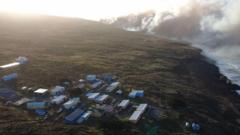Wildfires have burned an extensive portion of Amsterdam Island in the Indian Ocean, prompting evacuations and concerns over biodiversity and research disruption.
Amsterdam Island's Wildfires: A Severe Environmental Crisis in the Indian Ocean

Amsterdam Island's Wildfires: A Severe Environmental Crisis in the Indian Ocean
Recent wildfires devastate over half of Amsterdam Island, home to vital research, wildlife, and conservation efforts.
In a striking environmental incident, Amsterdam Island, a French territory nestled in the southern Indian Ocean, has faced severe wildfires for nearly a month, affecting more than 55% of its 54 square kilometers. The island is notable as a scientific research hub, though it does not host permanent residents. Researchers have occupied the site since the 1980s, conducting critical studies on climate and atmospheric conditions.
The blaze, which ignited on January 15 near the Pointe Bénédicte observatory, has forced the evacuation of 31 personnel to the nearby Réunion Island. This observatory, dedicated to tracking greenhouse gases, mercury, and aerosols, has become engulfed in flames, raising alarms within the scientific community. Rémi Chazot, a computer scientist stationed on the island, relayed to Le Monde the group’s sense of relief at the timely arrival of a nearby fishing boat that facilitated their evacuation: “This boat should have left a week earlier, but it had not caught its lobster quota. Otherwise, things would have gotten complicated.”
The wildfires are attributed to dry conditions and gusty winds, with speeds reaching 40 km/h (24 mph). The absence of rivers on the island has allowed the fire to spread rapidly, with peat bogs intensifying the flames. Initial assessments via satellite imagery have revealed damage to essential infrastructure, including solar panels, food supplies, and communication lines.
Moreover, the consequences for local wildlife are dire. Amsterdam Island’s unique climate supports a diverse range of species, including southern elephant seals, sub-Antarctic fur seals, and several albatross species, particularly the Amsterdam Albatross, which breeds exclusively there. Alarmingly, 84% of the world’s yellow-nosed albatross population also calls this island home, alongside colonies of Southern rockhopper penguins.
This dreadful event has hampered atmospheric research capabilities on the island for the first time in 45 years, as voiced by Marc Delotte, director of the Laboratory for Climate and Environmental Sciences (LCES). The interruption, he noted, will compromise critical data acquisition that informs understanding of climate variability.
On February 7, a reconnaissance mission commenced under the direction of the French navy, comprised of firefighters and technical personnel aimed at securing the settlement. The team will investigate the origins and spread of the wildfire while working to reinstate essential energy and water services to the beleaguered research center.
As these environmental calamities become increasingly prevalent, the plight of Amsterdam Island underscores the urgent need for focused conservation and proactive environmental management efforts in vulnerable regions around the globe.



















